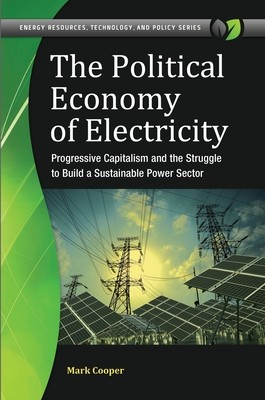
- We will send in 10–14 business days.
- Author: Mark Cooper
- Publisher: Praeger
- ISBN-10: 1440853428
- ISBN-13: 9781440853425
- Format: 15.5 x 23.6 x 3.3 cm, kieti viršeliai
- Language: English
- SAVE -10% with code: EXTRA
Reviews
Description
The environmental damage across the globe is a result of the success of capitalist industrialism--250 years of carbon pollution resulting from consumption of fossil fuels to drive the economy and the worldwide aspiration to ever-increasing levels of economic development. But capitalism has also produced the tools to solve the problems it has created in the form of a technological revolution in low-carbon renewables, distributed resources, and intelligent systems to integrate supply and demand. This book comprehensively examines the political economy of electricity and analyzes the challenge of transforming today's electricity sector to meet the dual goals of decarbonization and development expressed in the Paris Agreement.
Author Mark Cooper defines the dilemma of development and decarbonization as the great challenge facing the electricity industry and documents how the economic resources costs of a 100 percent-renewable portfolio has declined to the point that decarbonization can pay for itself, making the low-carbon renewable technologies that enable desired environmental and public-health benefits an easy sell. He identifies the substantial benefit of increasing use of information, communications, and advanced control technologies; shows how targeted innovation could speed the transition by a decade or two and lower the overall cost of the transition by as much as half; and explains why the flexible, multi-stakeholder approach of the Paris Agreement is the correct approach.
EXTRA 10 % discount with code: EXTRA
The promotion ends in 22d.15:26:57
The discount code is valid when purchasing from 10 €. Discounts do not stack.
- Author: Mark Cooper
- Publisher: Praeger
- ISBN-10: 1440853428
- ISBN-13: 9781440853425
- Format: 15.5 x 23.6 x 3.3 cm, kieti viršeliai
- Language: English English
The environmental damage across the globe is a result of the success of capitalist industrialism--250 years of carbon pollution resulting from consumption of fossil fuels to drive the economy and the worldwide aspiration to ever-increasing levels of economic development. But capitalism has also produced the tools to solve the problems it has created in the form of a technological revolution in low-carbon renewables, distributed resources, and intelligent systems to integrate supply and demand. This book comprehensively examines the political economy of electricity and analyzes the challenge of transforming today's electricity sector to meet the dual goals of decarbonization and development expressed in the Paris Agreement.
Author Mark Cooper defines the dilemma of development and decarbonization as the great challenge facing the electricity industry and documents how the economic resources costs of a 100 percent-renewable portfolio has declined to the point that decarbonization can pay for itself, making the low-carbon renewable technologies that enable desired environmental and public-health benefits an easy sell. He identifies the substantial benefit of increasing use of information, communications, and advanced control technologies; shows how targeted innovation could speed the transition by a decade or two and lower the overall cost of the transition by as much as half; and explains why the flexible, multi-stakeholder approach of the Paris Agreement is the correct approach.


Reviews